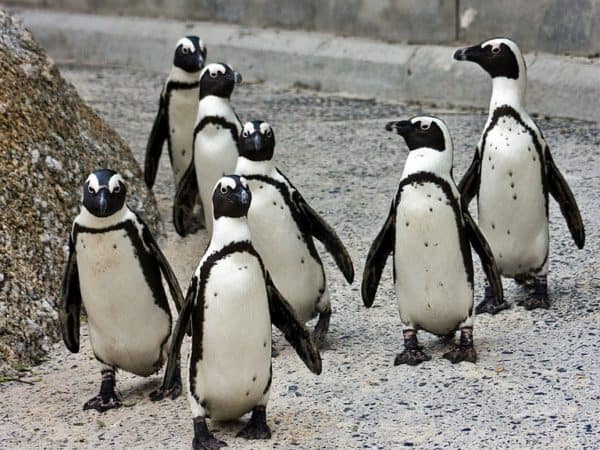
 A new study finds that climate change and overfishing are killing off juvenile African penguins in worrying numbers.
A new study finds that climate change and overfishing are killing off juvenile African penguins in worrying numbers.
Researchers satellite-tracked African penguins from eight sites off the west coast of South Africa and Namibia and found that juvenile penguins are getting caught in what’s called an ecological trap, which leads them to search for food in already-depleted waters.
Buy low, sell high. If the game’s on, don’t bug Dad. If there’s bacon on it, prepare to eat the whole thing. Just like the rest of us, penguins are creatures of habit who plan their moves around tried and true principles.
For the endangered African penguin, whose numbers have steadily declined over the past half-century, the main rules concern where best to find sardines and anchovies to fill up the belly, and thus, by long-held belief that where there’s warmer water and lots of chlorophyll, you’re going to find lots of fish to eat. No so much anymore, say researchers from the University of Cape Town.
“These were once reliable cues for prey-rich waters, but climate change and industrial fishing have depleted forage fish stocks in this system,” said Richard Sherley of the Department of Biological Sciences at the University of Cape Town and study co-author. “These signs can now lead them to places where these fish, the penguins’ main prey, are scarce.”
Once numbering an estimated 300,000 in the late 1950s in South Africa (and about 1.5 million at the beginning of the 20th century), the African penguin is now down to about 50,000 members, with scientists estimating further decreases of up to 50 per cent over the next 20 years and, possibly, extinction in upcoming years.
The declines make the lives and activities of remaining penguins that much more crucial and speak to the concern researchers are expressing over the misled juveniles caught in ecological traps. Research has revealed that the juveniles are experiencing high first-year mortality and are surviving at rates 50 per cent lower than penguins who travelled to other areas in search of food.
“As their foraging proficiency improves, juvenile penguins should switch from feeding on slow-swimming recruits to feeding on energy-rich adult fish.” say the study’s authors. “In the past, all of the juvenile penguins would have been well placed to do this. Today, however, the scarcity of sardines (in particular) off western South Africa is linked to low adult and juvenile penguin survival at Robben and Dassen islands, while low juvenile survival seems to be limiting growth of the Namibian penguin population.”
While ecological traps are well-observed in land creatures, their impact on marine systems is less understood, in part due to the large swaths of ocean that fish and marine animals cover over the course of their lifetimes.
In the main, the phenomenon occurs when a population subset is consistently drawn into a particular ecological region, usually in search of food, and yet does not thrive in that locale. A recent study of grizzly bears in southeastern British Columbia exposed an ecological trap, for instance, when it argued that the bears were being drawn into the Elk Valley area due to the plentiful supply of berries. Yet, the interaction with human populations in the region has proved deadly — collisions with cars and trains as well as controlled kills for human safety had cut down about 40 per cent of the grizzly population over the past decade.
The trick with ecological traps is how to get out of them, i.e., how to prevent more animals from repeating the same mistake as their earlier relatives did. For the African penguin, the best bet seems to be in efforts to curb overfishing by humans in critical areas, say the study’s researchers.
“There are winners and losers, and it’s probably the case that the African penguin would fall into the category of being losers at the moment,” says Stephen Votier, researcher at the University of Exeter in the U.K., to the CBC. “But there is a willingness to try to resolve that. One thing that has been quite positive is that the fish industry is engaging in this dialogue and it’s not just conservationists.”
“Hopefully by identifying [causes], you have the knowledge to try do something about it, and I think this is the step in the right direction,” says Votier.
Leave a Reply
You must be logged in to post a comment.




 Share
Share Tweet
Tweet Share
Share




Comment